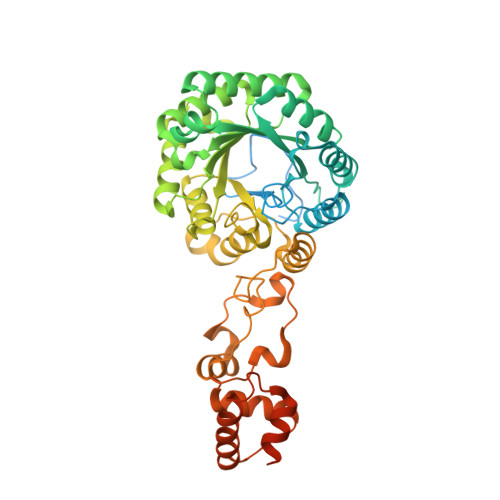Molecular Basis of the Evolution of Methylthioalkylmalate Synthase and the Diversity of Methionine-Derived Glucosinolates.
Kumar, R., Lee, S.G., Augustine, R., Reichelt, M., Vassao, D.G., Palavalli, M.H., Allen, A., Gershenzon, J., Jez, J.M., Bisht, N.C.(2019) Plant Cell 31: 1633-1647
- PubMed: 31023839
- DOI: https://doi.org/10.1105/tpc.19.00046
- Primary Citation of Related Structures:
6E1J - PubMed Abstract:
The globally cultivated Brassica species possess diverse aliphatic glucosinolates, which are important for plant defense and animal nutrition. The committed step in the side chain elongation of methionine-derived aliphatic glucosinolates is catalyzed by methylthioalkylmalate synthase, which likely evolved from the isopropylmalate synthases of leucine biosynthesis. However, the molecular basis for the evolution of methylthioalkylmalate synthase and its generation of natural product diversity in Brassica is poorly understood. Here, we show that Brassica genomes encode multiple methylthioalkylmalate synthases that have differences in expression profiles and 2-oxo substrate preferences, which account for the diversity of aliphatic glucosinolates across Brassica accessions. Analysis of the 2.1 ? resolution x-ray crystal structure of Brassica juncea methylthioalkylmalate synthase identified key active site residues responsible for controlling the specificity for different 2-oxo substrates and the determinants of side chain length in aliphatic glucosinolates. Overall, these results provide the evolutionary and biochemical foundation for the diversification of glucosinolate profiles across globally cultivated Brassica species, which could be used with ongoing breeding strategies toward the manipulation of beneficial glucosinolate compounds for animal health and plant protection.
Organizational Affiliation:
National Institute of Plant Genome Research, Aruna Asaf Ali Marg, New Delhi 110067, India.



















